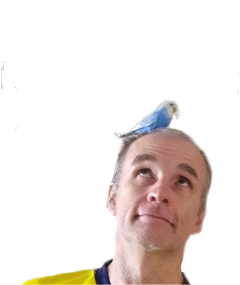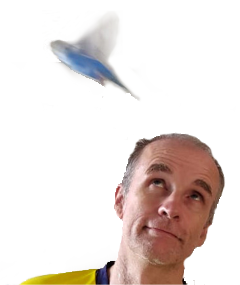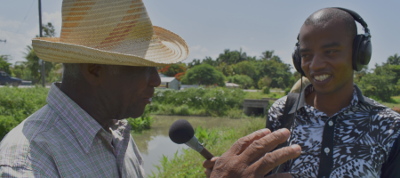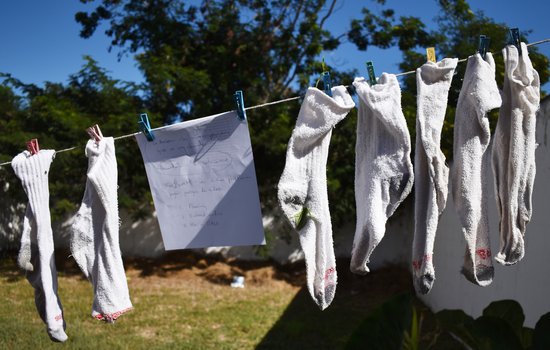
Notes, quotes and socks
Dec. 6, 2019
Why is it so hard to write an essay? All those brilliant ideas floating in your head, gossamer threads of connections and causes, you expect them to scintillate when you put them on the page. Instead, they splat like a gumboot in mud. Part of the problem, I think, is because we start in a transcendant mindset, straining to find words for something that exists beyond language. That's fine. That's where ideas come from. But we need to return to solid earth at some point without those ideas vanishing into the ether. I've found the best method is to turn writing into as mundane and mindless an activity as organizing your sock drawer.
My method derives originally from writing for radio. By its nature the meat and potatoes of a radio piece is the audio of other people talking. That is what I have to work with and that sets the bounds of what I can do. So until I've got that, there's no sense in worrying about what I'm trying to say. Instead I concentrate on the interviews. I make sure my subjects have free reign to talk, that the sound quality is good, that their personalities shine through. When I transcribe, I settle back and enjoy each conversation on its own merits, occasionally noting the bits that stick out, the bits that make me laugh or arch my eyebrows, the bits that sound like a real person and not a press release or a cliche. These might not have anything to do with the topic at hand: it could be a curious laugh, somebody swearing, an interesting anecdote, a cow's moo interrupting a train of thought. I write these on recipe cards, and when I'm done, I lay them out and try to put them in some order, like making a jigsaw puzzle.
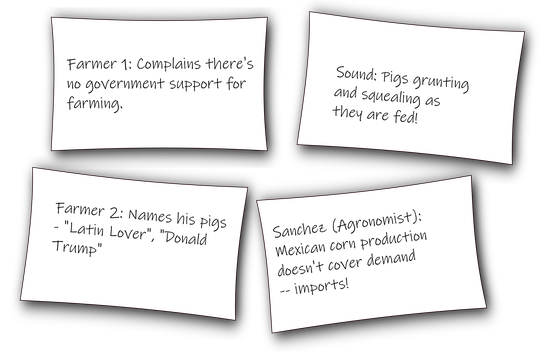
Sometimes the order is obvious: the cow mooing has to come after the bit where the farmer describes the farm, the description of the violent protest has to come before the police deny they used violence. Other times it's just a matter of taste: whatever tells the most engaging story or highlights the most appealing character. I used to think there was one true way of ordering any given set of cards, a manifestation of the unseen concept behind the story. But then the wind blew my painstaking arrangement across the room and I couldn't remember what I'd done. No big deal. The second arrangement turned out just as good as the first. Once the cards are in order, writing the script is easy, a matter of penning short bits of narration to introduce character, explain settings and set up quotes.
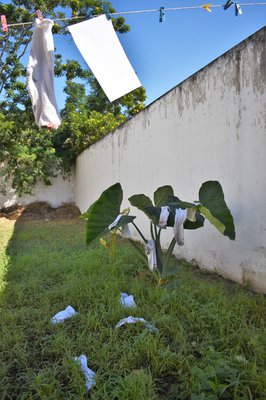
At university, I used a similar method to write essays. Here, the argument rather than the story is key, and the sources are academic papers, rather than interviews. But like the story, I tried not to think about my argument while I was researching. I didn't use recipe cards, but I would split my laptop screen, with a pdf of an academic paper on one side, and a simple text editor on the other, and as I read, take notes in the editor to remind me of any quote or fact that struck me as interesting. There aren't many jokes in academic papers, but I still let my intuition guide me to what was notable, like a child hunting shiny pebbles on a beach. When the reading was finished, I closed the pdfs, never to look at them again, and opened a second editor window. Into this I copied all my notes from the original editor, but this time in some kind of interesting order. As with radio, the order was arbitrary. It just needed to make sense and be useful, in the same way you can organize your socks by color, size, age or thickness and whichever method you choose, still have a better drawer than a messy unmatched jumble. Then, I closed the first editor window, opened a third, and began writing out the original quotations or facts that the notes referred to, adding bits of interstitial prose between them. This prose was mostly pragmatic. "Here is a new category of facts..." "Those facts are similar to these because..." "Despite what we saw with those facts, these facts suggest ..." By the end I had a decent rough draft, and my mouse had done most of the work. I was just a thin algorithm between all my desktop windows, selecting with my finger what goes where.
Of course this process is not entirely effort-free. Transcribing interviews, like reading academic articles, is a slog. And putting the bits you want to keep into some kind of order can be time-consuming. There's a lot of trial and error in organizing the notes, where you have to backtrack when you realize a sub-category you just made contradicts another category, or when one quote could just as easily go into two different categories. In radio, it's even more difficult, because you become personally attached to your best quotes. If you have to choose, for example, between two farmers who tell equally funny anecdotes, but you only need one farmer to illustrate the effect of falling sorghum prices, you must say goodbye to the other one forever. And although the linking text you write between your facts and quotes starts out as simple filler, you will find yourself writing more and more as you advance, to fill in holes, to explain your choices, to foreshadow facts to come. Eventually you will have written more of your own prose than citation. But it is much easier if you start by thinking of it as mortar joining bricks rather than the bricks themselves.

Finally, and most importantly, the order you assign your notes and quotes might be arbitrary, but the process is not as mechanical as it seems. In fact, it is here that the inspiration, that great transcendental moment you strained to reach in front of a blank page, actually takes flight. As mundane as it may seem, when you make connections between your notes, even something as simple as "both of these quotes refer to human migration" or "all these statistics demonstrate the arms build up in Europe before World War I", you are on the path to making some kind of argument. The more you shift your facts around, and find more intricate subcategories -- "these statistics show arms buildup accelerating before the war, but here's some examples of how people at the time thought war was not inevitable" -- the deeper your argument becomes. Eventually, you will have to step out on a limb and assert the argument explicitly, but it will have already revealed itself through the contours of your categories. When you finally state it, the effort will be slight, a few sentences in the introduction, and brief reminders in the text throughout.
There's no limit to how deep your argument can go, and you may get very abstract by the end, but you will have gotten there through the apparently routine act of organizing your notes. It's like organizing your sock drawer. You don't stare at your socks philosophizing about thickness, color and weave, you just dig your hands in and do it. It's a physical, tactile process. But if you do it with an open mind, you could, by the end, find yourself composing a short treatise on "what is the meaning of socks?" or "why are they always in the top drawer?"
The keys to this process are:
a) Don't think of writing as linear, where you start at the beginning and work your way towards the end. Instead, be willing to lay everything out and jump in and out of different sections, moving things back and forth and tidying things up as you go.
b) Don't strain to define your argument when you're researching. Just note things that seem interesting to you on their own merits.
c) Don't try and force your notes into an overarching argument. Experiment with different arrangements and orders, and let expedience and practicality be your guide rather than abstract concepts.
This method avoids the existential pain that can come with writing, but at the cost of a lot of drudgery. Opening and closing windows, copying and pasting repeatedly, writing notes out on recipe cards. The most annoying part is that once you have a nice outline of your notes, you need to go back to the sources to get the actual quotations, find page numbers, check the wording. In radio it's even worse. You need to return to your interviews and extract the audio clips. After several rewrites, the exact locations of the audio files may be lost and you will have to pick your way through hours of sound until you recognize the quotation. You might have timestamps to guide you but it's still more hit and miss than scanning a pdf.
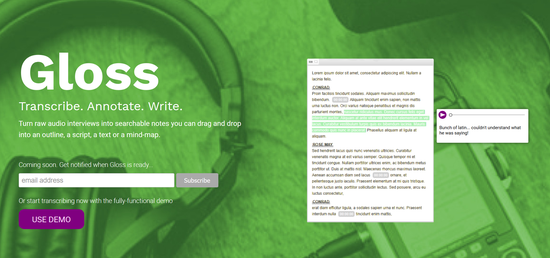
To make all this easier, I'm developing Gloss. It is software that allows you to transcribe interviews (by hand or automatically) and upload pdfs, mark the interesting bits and jot down notes. You will be able to search and tag the notes, categorize them and group them together by speaker, source, or theme. Then drag and drop them into exploratory outlines and mind-maps. Fill in the text that goes around them and voila, you have an essay or a radio script. At any time you can click the text, and hear original quotes played back or view the bibiographic reference. Print it with automatic citations, or extract the audio clips automatically into a digital audio workstation. Gloss is not quite ready yet, but you can sign up to my mailing list to get notified when it is, or start transcribing today with the fully-functional demo.
Check out Gloss: https://gloss.conradfox.com
